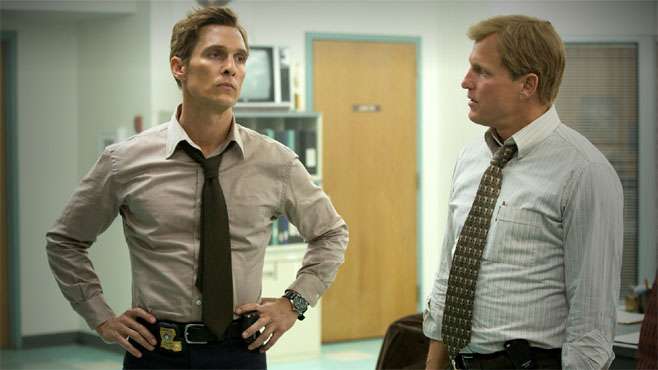*Spoiler Alert*
When I first heard of True Detective, I was unsure of what to expect from the show based on its title alone, which hints at yet another generic crime TV show. However, True Detective not only exceeds all expectations, but also entertainingly reinterprets the buddy-cop genre in an unabashed manner.
The narrative of the show is divided into multiple timelines over 17 years, following detectives Rust Cohle (Matthew McConaughey) and Marty Hart (Woody Harrelson) in search of a serial killer that targets children across the state of Louisiana. These two main characters are polar opposites in nearly every respect from the onset of the show. Rust is a chain-smoking, nihilistic, and attentive detective, picking out details and clues from his investigations. Marty on the other hand, is a self-appointed ‘family man’ who patronizes Rust for his eccentricity, bringing a down-to-earth dynamic to their relationship. This contrast between the two characters is the show’s strongest point, as their relationship precariously teeters between spite and loyalty.
This intriguing relationship is only further complicated by the crimes the detectives attempt to solve. True Detective is unapologetically brutal in its depiction of violence, serving to reinforce one of the show’s many themes: the unforgiving nature of humans and their actions towards others. Its crimes depict a serial killer obsessed with occult symbols and imagery, who Rust and Marty track as they piece together clues on the killer’s trail. This, however, does lead to certain problems in the resolution of the show: not every single symbol or clue seemed to be pertinent towards the solving of the crime, but rather are thrown in simply for the sake of illustrating that the show revolves around an occult theme.
The nature of the crimes shifts the primary antagonist from the killer to an unknown force of evil. Rust and Marty fight against something that isn’t simply human, but a supernatural and dark force testing the limits of their own humanity. This case, spanning over 17 years, breaks them: mentally, physically, and emotionally. Marty’s relationship with his family deteriorates as he uses his affairs as an outlet for his frustrations at work and at home. Rust, on the other hand, becomes consumed by the case, spending every waking moment attempting to discern the identity of the killer. Their lives are affected in different ways, but they eventually realize that relying on each other is the only way to find peace against this pervasive force.
This type of existential horror is explained by Rust when speaking to two fellow detectives in the current day. A personal loss earlier in his life coupled with his brutally nihilistic philosophy have created inner demons inside of him, alluding to another of the show’s major themes: we all have demons within us affecting our daily lives. The demons, he explains, are always on the prowl to take over his life:
“You, yourself, this whole big drama—it was never anything but a jerry-rig of presumption and dumb will; and you could just let go, finally know that you didn’t have to hold on so tight. To realize that all your life, you know, all you love, all you hate, all your memory, all your pain—it was all the same thing. It was all the same dream, a dream you had inside a locked room, a dream about being a person. And like a lot of dreams . . . there’s a monster at the end of it.”
The technical aspects of the show are top-notch as well. The cinematography is admirably executed, with the backdrop of Louisiana providing a bleak and harsh setting. Even the colour tone of the show is incredibly well done, serving to promote the show’s deliciously creepy theme. Its pacing is meticulous, combining slow drawls of dialogue with moments of frantic action. The six-minute tracking shot in the fourth episode, following Rust’s incursion into a drug den, is so intense that I realized I had curled up into a ball by the time the scene was over.
We live in a world where atrocities are committed against normal and kind-hearted people. True Detective serves as a counter to the escapism that the majority of cop shows provide—that the good guys always win in the end. Not only does the show recognize that our world is filled with despair, but it also trails the devastating impact on those who attempt to stem the tide of that despair. Rust and Marty illustrate that, in the end, we fight for each other, for those that we love and want to protect. And if sacrificing one’s humanity is necessary in order to protect those we love, it may be worth it in the end.









